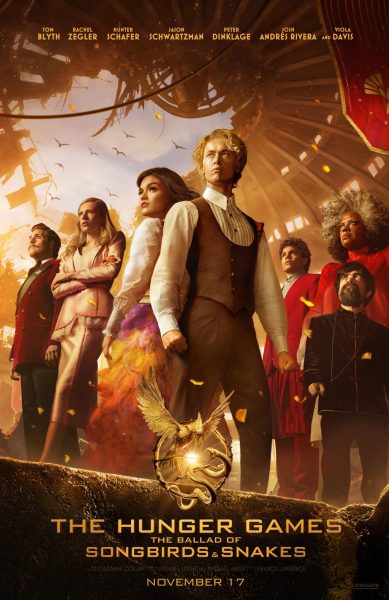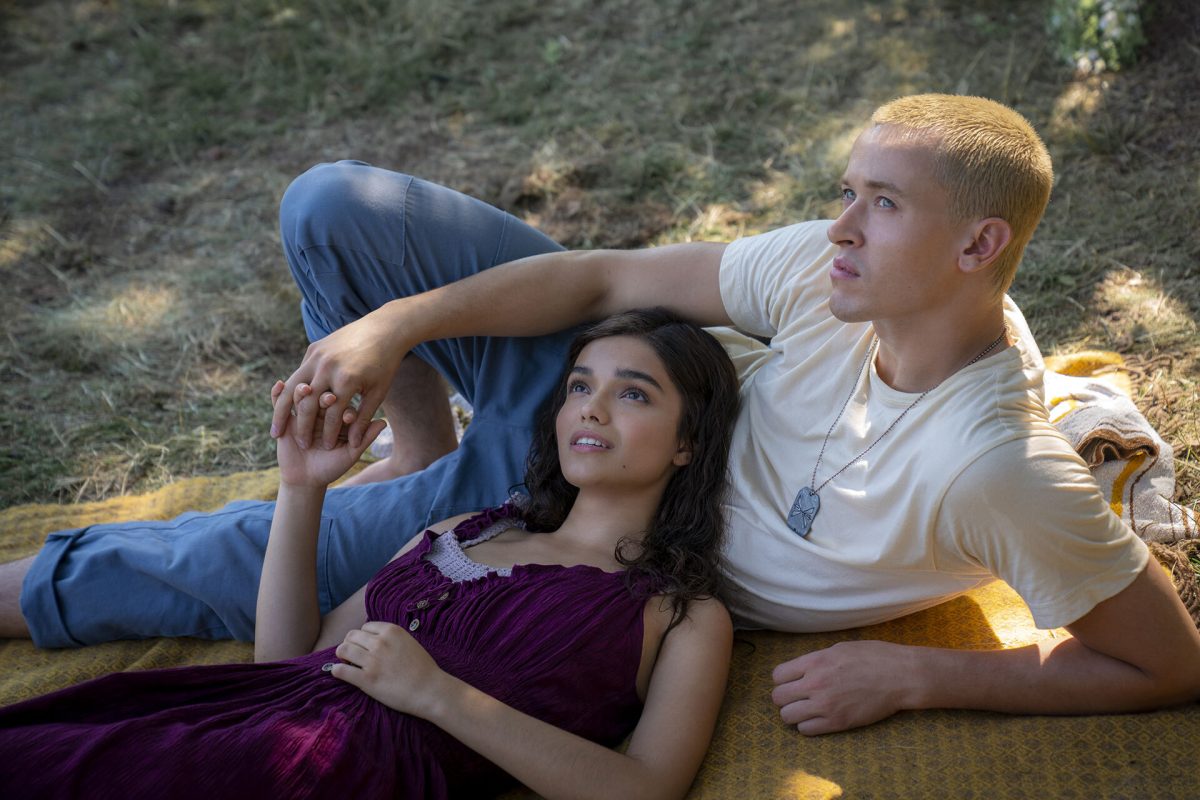Spoiler Warning: review contains mild plot spoilers for “The Ballad of Songbirds and Snakes.”
When “The Ballad of Songbirds and Snakes” (TBOSAS) was announced, expectations were high — and rightfully so. “The Hunger Games” films, directed by Francis Lawrence, were so wildly successful that many doubted a prequel could meet that standard. However, after nearly $100 million in opening weekend box office sales and the smallest two-week drop of the entire franchise, it is safe to say that the movie lived up to the anticipation.
PART I:
TBOSAS is separated into three parts, the same as the book that it is based on. Starting with “The Mentor,” which details the exposition that leads up to Part II: “The Prize.” This exposition includes the reaping of the 10th Hunger Games and the start of mentor-tribute relationships. “The Prize” is the star of the show, an upsetting truth, because it brings viewers back to the horrific Hunger Games themselves. The film then wraps up with “The Peacekeeper,” which delves into how a character so charming can be one so inherently evil.
The baseline plot of the film follows the origin story of the “Hunger Games” series antagonist, Panem’s tyrannical president Coriolanus Snow. Young Snow (played by Tom Blyth) is the villainous main character of the prequel.
With his family stripped of their wealth, Snow seeks a monetary prize that could ensure a better future for himself. The only way to win the prize was to be the best mentor to a tribute in the 10th annual Hunger Games. Snow is assigned to a young girl from District 12 (a nod to Katniss Everdeen). Snow believes that being assigned to a scrawny girl from 12 is a sure loss, but he is surprised when the girl shows immediate courage. Lucy Gray Baird (played by Rachel Zegler), is drawn in the reaping, and instead of crying or taking it silently as other tributes did, she starts to sing in defiance.
The real story begins when Lucy Gray arrives in the Capitol, and Snow gets to work making sure she survives the Games, strictly for his own gain. Yet when Snow is told he will never win the money, whether Lucy Gray survives or not, he continues fighting for her.
PART II:
The most notable performance in this film, in my opinion, has to go to Blyth in the leading role. Although most viewers went into the theaters aware of what Coriolanus Snow becomes, Blyth manages to make Snow someone to root for. He portrays emotion extremely well, helping viewers connect the dots between his thoughts and actions since they do not have access to the novel’s inner dialogue. In fact, he does such a good job with the character that viewers are even conflicted at the end, unsure if Snow was truly a villain from the start.
Zegler had another remarkable performance, presenting Lucy Gray as a free-spirited musician who is able to dance and charm a crowd, but when shoved into a brutal Hunger Games, is able to win. Her performance was successful mainly because of her fantastic singing scenes, in and out of the Games. Zegler, who reportedly sang live in all her scenes, demonstrates a beautiful voice rife with emotion — and a country twang — in this role. Her emotions become so much more prominent when singing, since Lucy Gray is an otherwise guarded character.
On the other hand, I was let down with Josh Andres Rivera’s portrayal of Sejanus Plinth, Snow’s well-meaning best friend. In the book, Sejanus is far more likable than in the movie. I found that each time Sejanus came on screen, his performance was repetitive at best and whiny at worst. In every scene he repeats the same honorable sentiment about the Capitol being full of “monsters” and wanting to assist the districts. He means well, but his way of spreading this message sucks the likability out of his character.
It feels wrong to not give an honorable mention to Hunter Schafer as Tigris Snow, Coriolanus Snow’s cousin who practically raised him, and Viola Davis as Dr. Volumnia Gaul, the wicked head Gamemaker for the 10th Hunger Games, in their respective performances. Both actors took their supporting roles that felt slightly two-dimensional in the book and admirably brought them to life. Schafer embodied the softer, sisterly Tigris, a caring voice of reason that tried to convince her cousin to be “good.” By showing a change in her emotions towards him throughout the movie, Schafer allows viewers to see Tigris’ caring qualities slip away from Snow as he starts to inherit his father’s evil. EGOT (Emmy, Grammy, Oscars, and Tony) awarded Davis was a perfect villain; Dr. Gaul’s unhinged mental state was obvious just by her facial and vocal expressions. She clearly mastered the “mad scientist” voice and the frenzied look in her eyes contributed a lot to her performance.

PART III:
Scenes throughout the entire film appear to be shot with an extremely wide lens to create a more intimate relationship with the characters. I think this is honestly revolutionary for an action film, making the fighting scenes even more cinematic. It definitely felt like the movie was meant for a wide screen, and thrived in theaters. I think other movies are going to follow suit and use this technique so every inch of the screen is filled with activity.
Francis Lawrence returned to the world of Panem with TBOSAS and was able to create that feeling of discomfort and suspense in viewers now as he did then. This is particularly present in moments like the haunting “Enjoy the show!” as the tributes and mentors entered the arena and the use of jabberjays to repeat the final screams of rebels at the hanging tree.
After two hours and 37 minutes of action, heartbreaking betrayal, and raw terror, Lawrence chose to end the movie with a voiceover quote featuring the voice of Donald Sutherland, who played President Snow in the original Hunger Games films. He recites arguably his most famous line, and one that could be deemed the central theme of the movie: “It’s the things we love most that destroy us.” Coriolanus Snow starts this movie as a smart boy struggling to make his way in the world, and he ends it as a man ready to become the monster we are familiar with. Somewhere in the middle, he fell in love, and in some ways, it tore him apart.
Since seeing this movie, I have not been able to get it (or the soundtrack) out of my head. All of the aspects from the acting to the cinematography — and Tom Blyth’s buzzcut — came together to create a movie that I dare say is better than the book. As Snow says himself, “Snow lands on top.”




























































